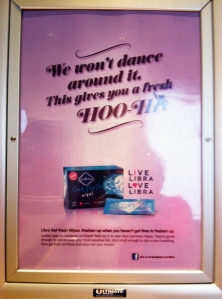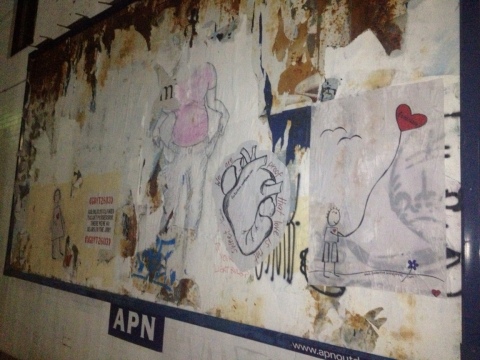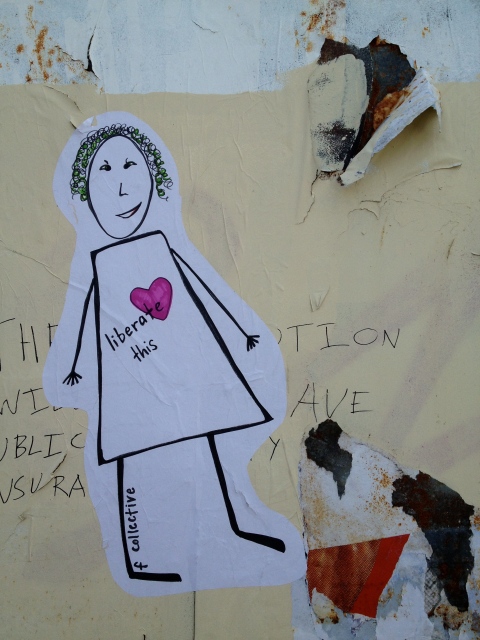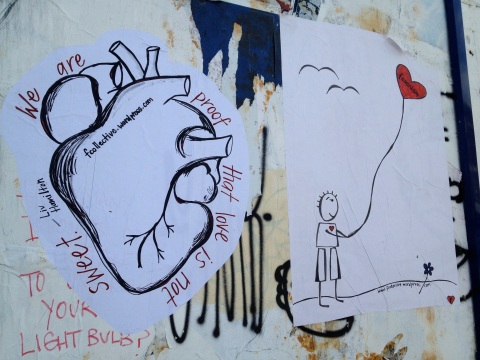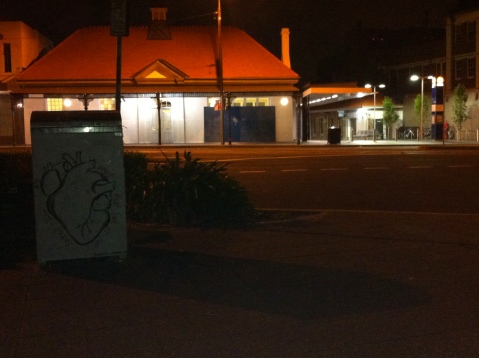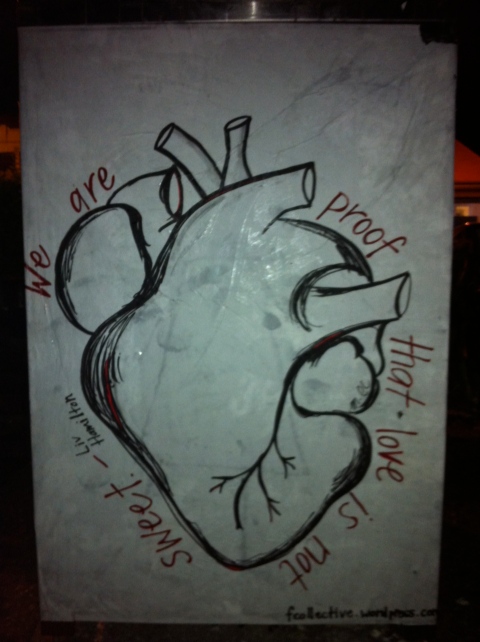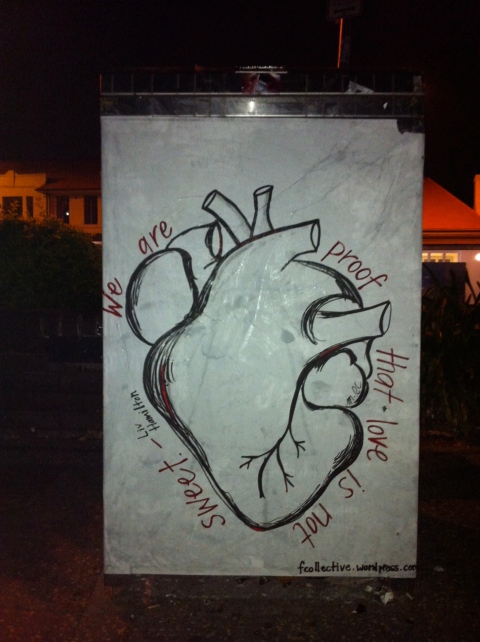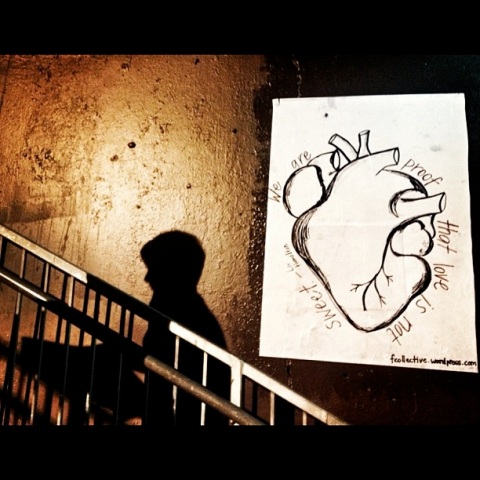On learned suspicion, good faith, and asylum seekers
July 21, 2013 § Leave a comment
In the wake of Rudd’s announcement of massive changes to asylum seeker policy and legislation in Australia, I’ve been once again rattled into thinking about this problem, this huge political problem, of institutionalised racism in Australia.
In amongst the political analysis, the proof that Manus is hellish, and the arguments for human rights, I want to make a fairly simple point.
One of the less urgent, but I believe, important things that bothers me about asylum seeker policy is that it teaches Australians to be deeply suspicious of others.

Asylum seekers on the roof of a detention centre, banner reads “Are not we your neighbours/ Don’t mistreat the foreigner”, from wikimedia commons
It’s not just that legislators in Australia don’t care enough about asylum seekers’ suffering, though the suffering is great and the policies awful. It’s that, in asking us to accept their policy decisions, they ask all Australians to be intensely suspicious of the motives of others. Is suspicious even a strong enough word? In order to accept that chucking people in indefinite detention on god-forsaken islands is ok, we have to believe that they are shifty, disingenuous, dangerous. Most recently, in order to say, as a country, “you may never come here, you may never seek asylum here”, we are being asked to believe that these people in boats shouldn’t be asking asylum of us (relatively, globally speaking) rich people at all, and if they do, it’s for bad, bad reasons.
Maybe KRudd was right all along. This is not just a matter of fact but a matter of faith. If fact were the problem, this debate would be over.
We are being taught to believe, deeply and without proof, that people who come here by boat want something from us that they don’t deserve. We have taught ourselves to believe that these people are grasping, evil, dirty, sexist, fraudsters.
A bit of a personal story: my mum taught me to approach with good faith those who have little, or less than me. I remember walking through Maitland mall, and having Trevor, the homeless man who lived around there, address her by name and she would stop for a chat. Jimmy, the disabled guy down the road, would ask her about our dog every day as he walked by and she always had time.
This isn’t some idyllic memory. My feelings toward these men were mixed, and I was a bit scared of Trevor, honestly. Nonetheless it was my experience that most folks are eager to repay a kindness if they can. One time Jimmy brought us an old, amazingly sturdy fan in the heat of summer. I think my mum still has it.
I don’t think my mum’s attitude is so unique. I know there are generous people on both sides of politics. Why can’t we collectively believe then, that asylum seekers arriving by boat could be worthwhile residents and citizens of Australia, one day? It’s not such a stretch.
What I’m saying is that suspicion or good faith is learned, and Australians have been learning to believe for a long time now that those seeking asylum are undeserving. A frightening micro-politics of the self, if you like. I do not believe that asylum seekers are singularly bad, with bad motivations. I think the consequences of believing they are dehumanises not just the asylum seekers, but those refusing asylum.
Freshen your hoo-ha (or why Libra can kiss my smelly vagina)
May 26, 2013 § 15 Comments
Let me start with the necessary caveats: consumer activism isn’t usually my thing, though I reckon its got its place. Destroy the Joint (who started protesting Alan Jones and are now working on getting Facebook to disallow misogynistic groups) have done some great stuff in this area, even if its not everyone’s feminism.
However, today I was having lunch with my Dad and his partner in a pub in Balmain, enjoying the glorious Sydney sunshine. I went to the loo, and saw a sticker on the mirror. “Get fresh with Libra wipes,” it told me.
I instantly knew Libra were talking about “getting fresh” vaginas. At first I hoped I was mistaken. Then I turned around and saw this:
Libra are telling people that their vaginas need ‘freshening’.
Libra, as far as I know, is a tampon company. Pads too. I think they mostly market to younger girls, with bright colours and a boppy “Live Love Libra” slogan. A quick internet search revealed that Libra is owned by SCA, or Svenska Cellulosa Aktiebolaget. I couldn’t find any immediate dirt on them, despite the bad rep a lot of hygiene companies like Unilever have with women’s groups.
I can’t even be bothered with unpacking the irony of the word (is it even a word?) “HOO-HA” when used in combination with “we won’t dance around it.”
I am not of the “let’s talk about my vagina” school of feminism. For better or worse (quite probably worse), I feel reserved about these things, in addition to having, shall we say, some control issues regarding my body. However, I have lots of feminist comrades who ARE of the “let’s talk our bodies” variety, and they are hero(ine)s in a world that teaches us that our bodies are smelly, out-of-control things in need of constant disciplining and upkeep with random stuff (like Libra products). Feminists and women before me who did the hard work of health promotion and myth-busting, such as these paradigm-shifters, didn’t do that work for nothing, even if this bullshit is still happening. They’ve taught me to recognise a bit of body hate when I see it.
The reason this ad annoyed me so much that I feel driven to talk VAGINA on my blog, despite my mild discomfort, is that Libra are making such a blatant play on body insecurity. This is especially the case for girls and younger women, given that that’s who Libra seem to be targeting. The “am I normal am I ok am I doing stuff right” self-talk that is a constant in many heads, just got a big “NO YOU ARE NOT OK” from Libra. All in order to sell unnecessary, potentially harmful vagina-cleaner, as though this part of our bodies was a kitchen drain.
So, in case it’s not obvious: MY VAGINA DOES NOT SMELL BAD, AND IF YOU HAVE ONE, I’M PRETTY SURE YOURS IS FINE TOO. If someone thinks your vagina smells bad, they are very probably not worth your time. If you’re worried your vagina smells bad, go to a good (hopefully feminist) doctor and get a check up. In Sydney I can recommend the Uni of Sydney Health Service and Leichardt Women’s Medical Centre. The Australian Lesbian Medical Association also has this list. Please make other suggestions in the comments if you’ve got ’em.
And by the way, if you do feel inclined to boycott, here’s a handy list of alternatives to the usual ‘feminine hygiene’ route.
Lastly: VAGINA VAGINA VAGINA. Libra and its HOO-HAs can go kiss my smelly vag.
On Femen, action, Mia Freedman, and seeing racism
May 17, 2013 § 7 Comments
I am deeply interested in feminist action. Not just theory, but action, doing, creating, responding. Of course, theory is a form of doing too, but people’s theories don’t impact the world on their own – we have to enact them, step by painful or joyous or just-do-it step, if we’re to make a dent in the things we want to change.
The enviro movement is good at this. Just look at these guys. Feminism, in my experience, not so much. There are riot grrrls, past and present, and other feminist activists making change in a variety of movements, but overall, I often feel like I lack inspiration on the action front.
Which is what led me, I think, to make this uninspired FB status update about Femen, a Ukrainian feminist group:
I like their tactics but think their views of Muslim women (as represented in this article) are ignorant… naked, veiled, it’s all about women having the power/ environment to be able to do what they want with their bodies, right? What do others think? http://stream.aljazeera.com/story/future-feminism-0022381
If you’ve clicked on the link, you’ll see, perhaps quicker than I did, the Femen are not only ‘feminist’ in the sense of wanting gender equality, they are colonialist and Islamophobic. They want to tell a whole heap of Muslim women what to do and how to be free.
After thinking about it for more than ten minutes, I decided it wasn’t a good plan to separate praise of Femen’s tactics from their politics, and I updated my page accordingly. I’ve wondered since why I didn’t see that earlier, and I’ve concluded that the reason I saw their tactics in the first place, before I saw their racism, is that I’m just not impacted by their racism in the way a Muslim person would be. So, I think in future I’ll try to remember to prioritize the question of oppression of others (not just myself or my identity groups) first.
I don’t say this as an exercise in privilege guilt but to record something that seems useful to me, and I’ll quote here one of the things I read while I was thinking about it:
The thing is, many Muslim women are indeed oppressed, just like many non-Muslim women around the world. Patriarchy is a global problem, and I will not deny the misogyny in my culture. However, please, do not insult me, my intelligence, my color, my heritage and my body, and please don’t do it because you think you’re ‘saving’ me. There are many Muslim feminists in all Muslim countries, a feminist’s job should be solidarity, amplifying voices of local feminists, not imagining they don’t exist. Femen is simply very euro-centric, racist and colonialist. I haven’t yet seen a black Femen protester, they are racist because they amplify European ideals of beauty; white, skinny, and young. I can’t believe this isn’t more obvious to people. Personally, Femen, shut the fuck up, and don’t claim that you speak for me, or anybody else. Stop dictating women that they need to be nude to be free, that’s just as bad as men dictating them to be covered.
That was from a woman called Momina Amjad, who made the top comment on this article.
A Muslim feminist artist and activist I’ve worked with in the past made several important points too: that in the imagery in all the articles the women’s breasts are blanked out, a reminder that the global North is not exactly ‘free’; that Femen are specifically perpetuating colonialism and speaking at Muslim women like they were stupid.
In the last few days, a bunch of white boys going to a party got dressed up as the judges from TV show The Voice, including African-American singer Seal. They posted a photo to twitter and it got a lot of attention in some likely unexpected ways. Mia Freedman, an Australian media personality and prominent feminist has responded to this incident of blackface by asking everyone (from her popular feminist-lite website) to just calm down.
Sunili Govinnage has articulated the problems with Freedman’s position that a little picture of blackface is all too annoying to deal with, by noting that Freedman has used her power to end, rather than start, a conversation about racism. In doing so, she has challenged Freedman’s power rather than just letting it stand. All I can add is that I think perhaps, as with my FB status moment, Freedman is suffering from vision problems: she didn’t ‘see’ the racism because her position of privilege meant she had other concerns. She was able to deprioritise what for others is absolutely crucial, i.e. an assault on their status as fully-recognised human beings.
I’ll get back to what caught my attention about Femen in the first place: action. I think that when it comes to action, to doing something in a public way that calls for a (political, cultural) response, it’s equally if not more important than when writing, to think first about your impact and whether you’re being – to put it delicately – a racist, sexist, or otherwise oppressive shithead. The point of direct action by activists, is to impact, hard. If we do action well, and we do make that impact, it’s important to make damned sure we aren’t smashing people whose struggles we just didn’t SEE.
February 26, 2013 § Leave a comment
Some new word pictures on the f blog – enjoy.
So often feminism exists between hope and despair; hope that we can make our lives better; despair that the oppressions of the every day still exist.
We keep fighting, to remind ourselves of the hope part of the riddle.
We engage in acts that are (even a little bit) bigger than ourselves. We fight, we plot, we dream.
We love.
Last night these images appeared on the streets of the inner west in Sydney.
Our love is not always sweet. Lovers are warriors; love can be an act of rebellion; love may be the bulwark that protects us and sustains us. Love may even win.
Love,
The F collective.
The line ‘we are proof that love is not sweet’ is drawn from a piece of writing by Liv Hamilton. It’s available in the F zine, here.
